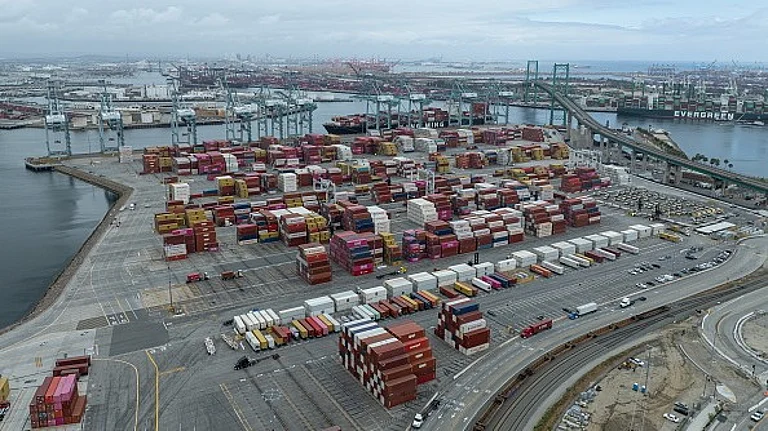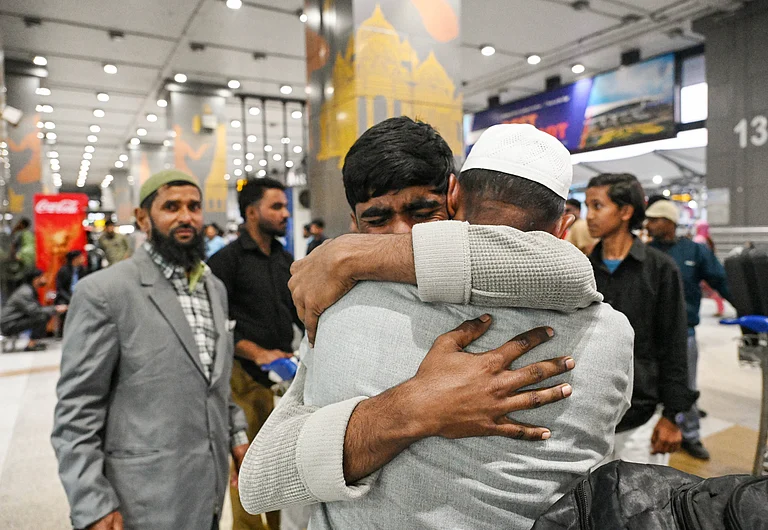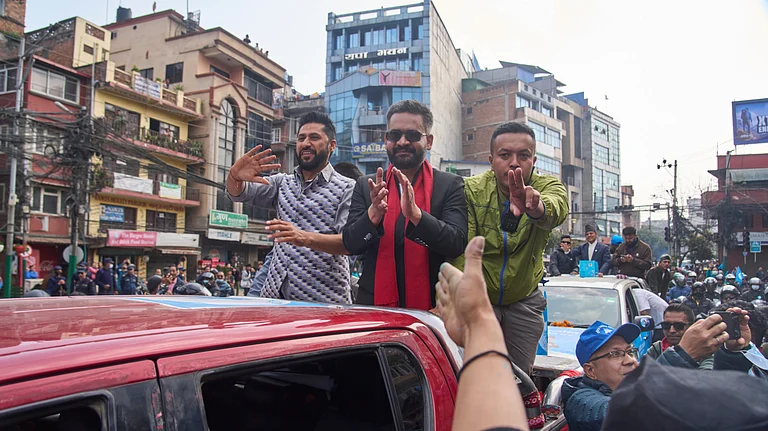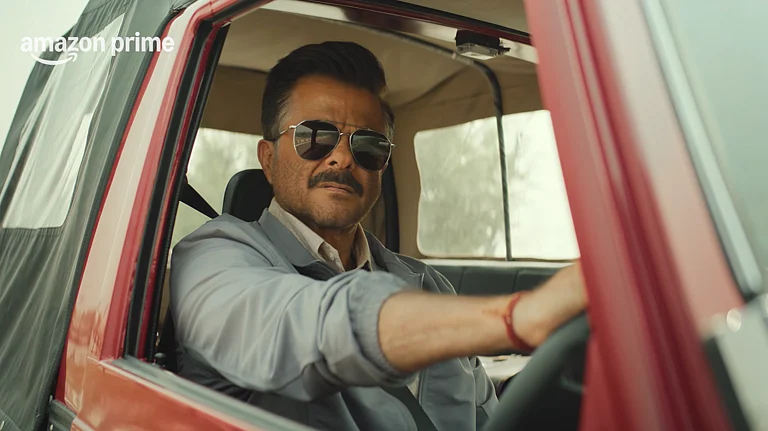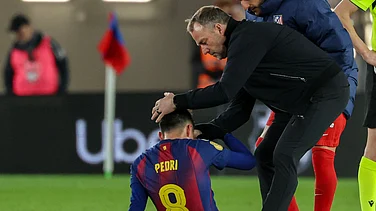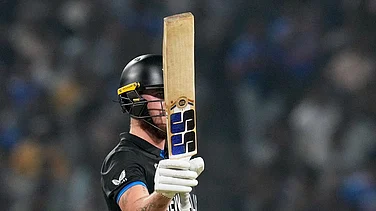The date was May 28. In Mokhra village in Rohtak district of Haryana, village residents, khap leaders and farmers had gathered in an ancient kothi. As they watched the visuals of their “daughters” being dragged and stomped upon by Delhi Police in the national capital on a loop on their mobile phones, they seethed with anger. Words like “dictatorship”, “tanashahi” (Fascism), “nindaniya” (condemnable) and “atyachar” (atrocity) reverberated the walls of the kothi.
A few kilometres from where their daughters—protesting wrestlers who are demanding the arrest of the Wrestling Federation of India (WFI) president Brij Bhushan Sharan Singh —were roughed up, Prime Minister Narendra Modi inaugurated the new Parliament. The protesting wrestlers had planned a march from Jantar Mantar to the new Parliament. On the way, they were stopped.
The police dragged a struggling Sangeeta Phogat and shoved her into the police van. She was later detained, along with Sakshi Malik, Vinesh Phogat, Bajrang Punia, and other protesters.
A few days later, the incident is still a talking point in Mokhra village. A few men are gathered at the Bali Pehalwan Darwaza—a prominent landmark—and are puffing hookah while discussing the May 28 incident. They feel if justice is not served soon, the wrestlers’ protest might grow bigger with women and men, youth and old coming on the streets.
The family members of the wrestlers are still in a state of disbelief and shock. While recollecting the events on that day, Sudesh Malik, 54, the mother of Olympian Sakshi Malik, says: “The police brutally nabbed them after they sat down as they were not allowed to march any further. The entire nation watched as our daughters were manhandled. They sustained injuries. Our flag was dragged down.”
She is upset that the wrestlers are being treated as criminals while Brij Bhushan continues to roam free. Malik herself was detained at the Mehrauli Police Station. She choked after a police officer stepped on her dupatta and dragged her. “I requested them to spare me after which they detained me. I still feel pain in my left chest, she says.
The protesters were slapped with multiple charges under the IPC including Sections 147 (rioting), 149 (unlawful assembly) and 188 (disobedience to order), among others.
Shaken by the government’s treatment, the Olympic, Asian Games, and Commonwealth medal-winning wrestlers decided to immerse their medals in the Ganga River. They reached Har Ki Pauri in Haridwar on the evening of May 30. Huddled on the river bank for over an hour, they broke down as they clutched their medals while their family members held them close and mourned along. As the crowd grew bigger—some in their support and some opposing them—Bharatiya Kisan Union (BKU) president and Khap leader Naresh Tikait reached the spot with other Khap chaudharys and dissuaded the wrestlers from immersing their medals.
The wrestlers’ months-long tussle to get Singh arrested exposes how the rampant issue of sexual violence against women continues to be met with steely neglect. Several women associated with the wrestlers have revealed that sexual harassment within the Federation has not been a new instance. It was always there but ‘fear’ of the power and influence of Singh, infamous for sabotaging careers to tend to his ego, had forced them to remain silent.
“Ten years ago, when I had visited a camp in Lucknow with Vinesh, the other girls, who were there from the Federation, confided in person about Singh’s harassment. As a mother and a woman, I felt helpless about what was happening to these children,” says Prem Lata, the mother of Asian Championship gold medalist Vinesh Phogat. Malik says she first learnt of Singh’s misconduct when her daughter Sakshi was harassed by him in 2012 during an international event. Coaches and the Federation have also been accused of mitigating the same. “More than often, the coaches would coerce the girls to visit Singh alone at night, inside his room. They acted on his instructions. Them, acting as middlemen, have worsened the situation for female players,” says Prem Lata.
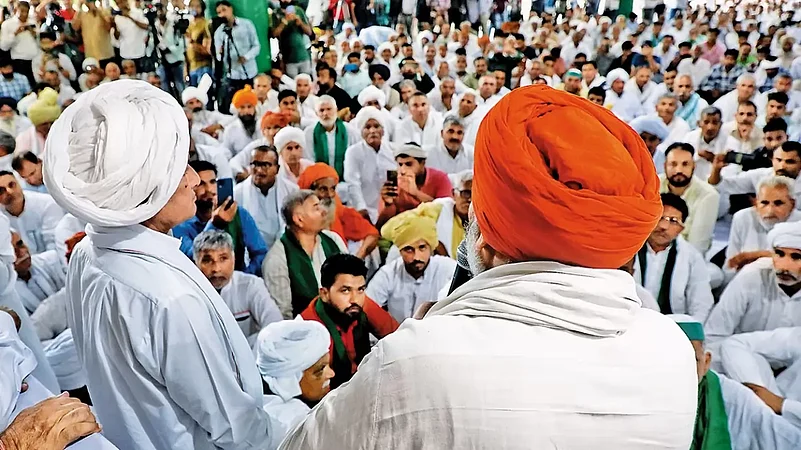
Staring at the framed photographs inside her Balali residence of Vinesh standing next to Modi, her face droops as she recalls Vinesh’s conversation with the Prime Minister and what followed. “Vinesh had revealed to him about Singh’s misconduct a year ago, to which he responded saying, ‘I know about it all’. Even sports minister Anurag Thakur was made aware of it. However, shortly after this conversation, Vinesh started receiving threatening calls from Singh,” sighs Prem Lata, who recalls that the family got relentless menacing calls which left Vinesh and the family quite distressed.
The trophies and awards adorning the walls and side corners of the kothi trace their family’s journey and achievements. Something, however, seemed missing. “There are no medals in this house anymore. The children cried as they took them all away after deciding to submerge them in the Ganga,” she adds.
Slogans against the government were raised and Mahabharata references were invoked at the Mahapanchayat called by Khap leaders and supported by the BKU in Muzaffarnagar’s historic Shoram Chaupal on June 1. Thousands of Khap leaders and villagers, enraged at their mistreatment and Singh’s impunity gathered to decide the course of the wrestlers’ protest. They accused the ruling BJP of acting as a dictator and shielding “its own people.”
“Prime Minister Modi has lost to a ‘Bahubali’,” said BKU Pradesh Adhyaksh Ratan Mann. Similar sentiments were expressed by the locals and leaders who questioned the Modi government at the Centre and the Yogi Adityanath government in Uttar Pradesh over their failure to take any action against Singh.
Among the handful of women, present at the Mahapanchayat for a brief time, organised to address the state’s mistreatment of “daughters and sisters”, was Mamta Chaudhary. A resident of Muzaffarnagar and member of the Sahyog Foundation, an organisation working on women’s issues, Chaudhary shares that the treatment of the wrestlers and daughters has enraged the women in the villages. “We have resolved to hit the roads if justice is denied to our daughters,” she says.
In another Mahapanchayat at Kurukshetra on June 2, it was decided that the wrestlers and protesters will return to Jantar Mantar on June 9 and “nothing can stop them”. However, later BKU spokesperson Rakesh Tikait said that the wrestlers will not sit in at Jantar Mantar on the decided date.
After the wrestlers’ meetings with Union Home Minister Amit Shah on June 3 and Sports Minister Anurag Thakur on June 7, they have decided to stay their protest till June 15 until further investigations.
‘Beti Bachao?’
“International female wrestlers Gita, Babita, Vinesh and Ritu …You are heartily welcomed in players’ village Balali…”
At every nook and corner of these villages is a young girl aspiring to be a wrestler or a sportsperson, following the footsteps of the women wrestlers fighting for justice. The villagers, however, are no longer sure if it is safe to send their young children outside and are gradually losing faith in coaches and sports authorities, because ‘what if?’
The case of Singh has opened a can of worms for these girls, their families, and their villages, who have struggled for generations to finally realise some emancipation through sports.
The lack of any action against Bhushan in the POCSO case has become the primary reason for palpable anger among villagers and locals. “The police state that due to the lack of evidence, no arrest can be made. What further evidence do they need? Several women and girls, who are recognised on an international platform, have spoken. How can all of them lie?” says a disgruntled Kalu Ram, a 52-year-old farmer from Mokhra, Rohtak district.
The FIR registered against Singh on April 28 following the intervention of the Supreme Court reveals similar murky facts. The FIRs, filed by six wrestlers and one minor, charged the BJP MP under various IPC sections, including assaulting a woman to outrage her modesty (Section 354), sexual harassment (354 A), and stalking (354 D), which are punishable with jail terms of two-three years. He has also been booked under the POCSO Act. The wrestlers have detailed at least two instances of demanding “sexual favours” under the garb of professional assistance and at least over ten incidents of sexual harassment. Several complainants, including Vinesh, Sangeeta, and Sakshi, have accused Singh of touching them inappropriately under the pretext of checking their breath.
Tikait demands accountability from the government on the dual standards of the treatment of Singh. Pointing to the Centre’s impunity to Singh, he asks: “The government must clarify if others accused of similar charges in the past have been arrested first or not. If yes, why is Bhushan not arrested yet? If not, we request the government to amend the law itself so that investigations will be done before any arrests in such cases in the future,” he says.
Parallelly, a sudden awareness of POCSO has hit these villages. Locals have started raising questions about the breach of the Act and alleged that the government is outrightly dictatorial in its treatment of an alleged sexual offender. “For these leaders, laws are different than those for the children of the poor. Today, if the same crime would have been done by a politician from the Opposition, he would have been put behind bars in the blink of an eye,” says Ved Pal Malik, Sakshi’s uncle. Villagers and Khap leaders highlight how the laws fall flat when it came to persecuting one of “their own”.
Meanwhile, several media reports have quoted the minor’s father saying that his daughter made ‘certain false allegations’ in the FIR and was ‘not a minor’ during the incident. A few days back, fake news alleging that the minor withdrew her FIR was circulated in the media, which was refuted by her father shortly after. However, when reached, the father was not available to confirm either of the claims.
Senior advocate Narender Hooda, who was representing the minor in the POCSO case, says that he cannot conform with the claims. Supreme Court lawyer, senior advocate Rebecca Mammen John, who has been approached by three complainants for legal advice tells: “As of now, there is nobody in custody and one can’t just speculate what is going on with the case. The chargesheet is yet to be filed.” Taking a dig at multiple “speculative news”, she refuses to confirm or deny if there have been any retractions in the minor’s FIR.
John explains that one cannot just withdraw an FIR, only the police can cancel after a magistrate mitigates the same. “Fresh statements can, however, be recorded or previous statements may be retracted. It will then be up to a court to decide if the FIR and chargesheet stand enough ground for a trial,” she adds.
‘No Vote For BJP’
Locals and leaders accused the Modi-led BJP government of fanning communal hatred in the country and the state. “The BJP government has divided us along religious differences, caused communal riots in the country and is now promoting caste politics when the fight is for the safety and integrity of our daughters who have upheld the nation’s tricolour.”
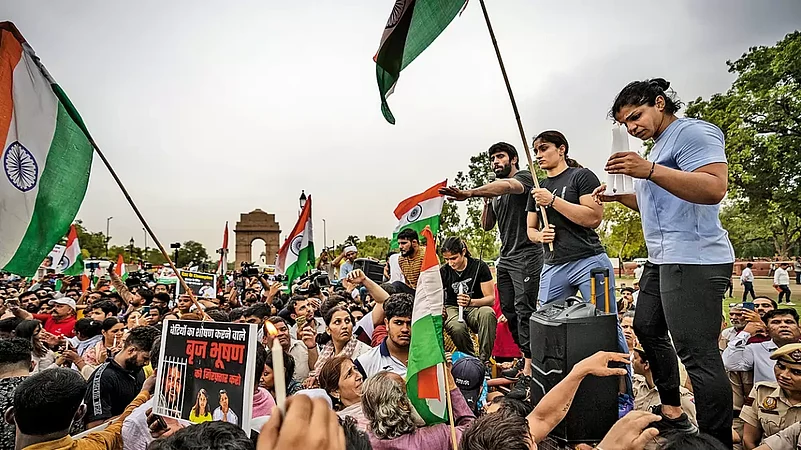
The locals expressed their discontent with the government’s actions. “We made a mistake by voting the BJP to power and have come to realise it,” says Ror Khap leader Rajendra Arya Dadupur. He accuses the BJP of putting an end to dissent and negotiations with the government. “They trust their panna pramukhs but not their own citizens,” he says.
The village residents share that they voted for the BJP in the previous elections in hopes of “Achche Din”. The government rather followed the Colonial politics of divide and rule and gave them “religion and caste-based politics,” deepening communal sentiments. “This government is responsible for the death of farmers, they rendered the youth unemployed and have a history of shielding sexual offenders and criminals,” the villagers say.
“The 2024 votes will be our means of vengeance regardless of whether justice is served or not,” says Ram Kumar Fauji, a Panchayat leader, who claims that ‘Beti Bachao, Beti Padhao’, for this government is just a gimmick. “This government never knew to respect any beti.”
“The arrest of Bhushan will definitely be a win for the protest. But, this will not alter our demand to have the government at the Centre, removed,” says 35-year-old Satish Malik, who, too, belongs to a pehelwan family in Mokhra.
Caste and Community Politics
The protest against Singh has additionally stirred caste dynamics in Haryana and Uttar Pradesh. With Khaps stepping in the support of the protesting wrestlers, a handful of Rajput and Thakur groups have allegedly extended their support to Singh. The khap and farmer leaders accused the government of politicising the protest along caste lines. “The wrestlers wrap the nation’s tricolour when they win medals for the country, it is their only caste identity,” they say adding that PM Modi refers to the girls as his daughters when they score medals, but now they have become a caste group as they fight for the safety of women.
N Sukumar, a Political Science professor at Delhi University, observes that in a country as diverse and fragmented along caste lines as India, there is no escape of caste from any institution—social, political, or sports. In the context of the wrestlers’ protest, no arrest of Singh highlights the caste strength he upholds. “The impunity he enjoys is a prime example of what strength caste plays in this movement. In the earlier days of the movement, Bhushan proclaimed that he will immediately resign if Amit Shah or PM Modi ask him to. This one statement is an interesting phenomenon to understand caste. He doesn’t care if the investigation perhaps proves him wrong, it seems he will only take instructions from his upper caste counterparts,” says Sukumar.
The intersectional socio-geographic location, gender and background of the players vis-a-vis the ministers and Singh are pivotal in shaping caste dynamics within the sports fraternity. One needs to understand that Jats are placed below Thakurs in the overall caste hierarchy. “Jats might be up the pyramid among other castes in the northwestern state, but Thakurs and Brahmins are higher in caste politics of the movement. Bhushan, being a Thakur will thus not give in easily.” His close affiliation with seers and role in LK Advani’s rathyatra leading to the Babri Masjid demolition indicates his upper caste power.
Sadhus and seers protect Brahminical patriarchal values. Hence a movement led by women, an already marginalised community in a misogynist, male-dominated, patriarchal set-up, will further be suppressed to keep these patriarchal caste values and status quo intact, observes Sukumar, adding, any challenge to patriarchal Brahmanism will be countered with upper caste forces.
Sukumar further adds there is no doubt that Khaps, too, represent caste values. “Let’s take the example of Vandana Katariya, a hockey player from Haridwar. When India lost in the 2021 Tokyo Olympic hockey, Vandana, who belongs to the Dalit community, was subjected to casteist slurs. She, along with other Dalit players was blamed for the loss because of their caste identity. It is crucial to see that in Haridwar, which also has assemblies of many khap panchayats, no one came in support of her. Hence, we cannot overrule the caste politics that subtly embroils the movement.”
(This story appeared in the print as 'Wrestlers Vs Brij Bhushan)



